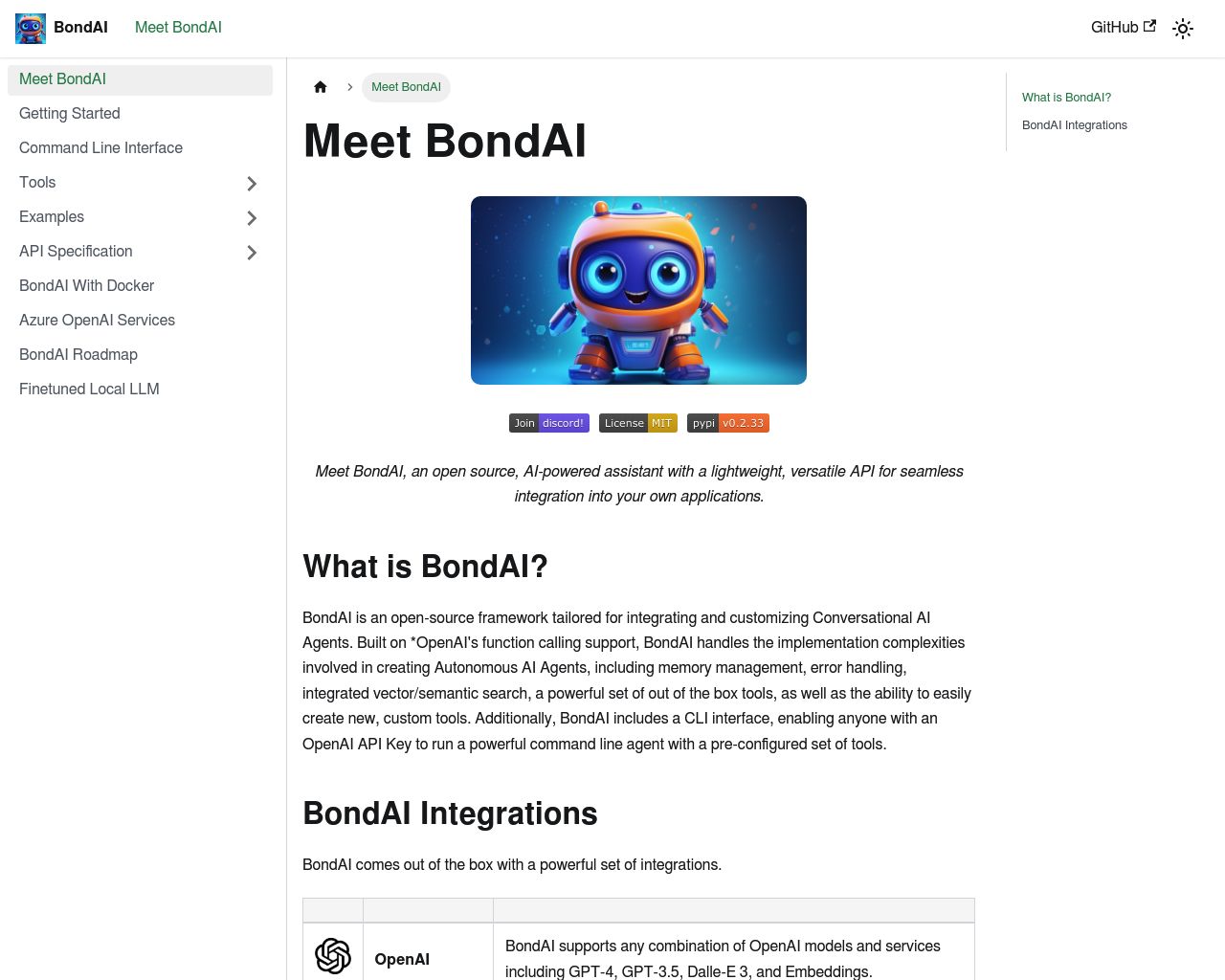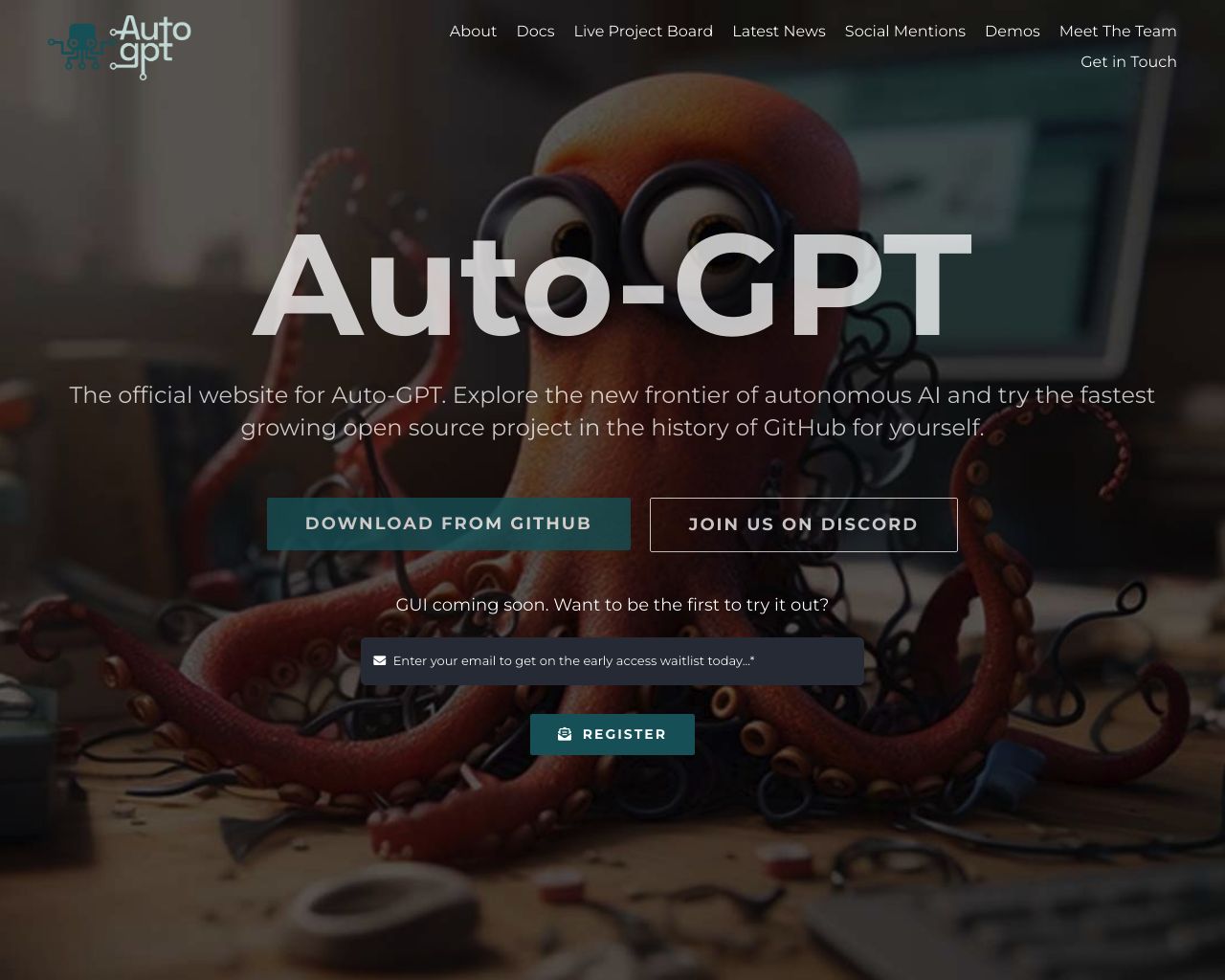BondAI and AutoGPT: A Comparative Analysis
AI agent development has transformed from complex coding tasks to accessible, powerful tools for businesses and developers alike. BondAI and AutoGPT stand out as innovative platforms in this space, each offering unique approaches to autonomous AI systems. This comparison delves into their core features, strengths, and limitations, providing insights for technical teams, business leaders, and AI enthusiasts. We’ll explore how these platforms tackle memory management, task execution, and integration capabilities, and introduce SmythOS as a comprehensive solution that addresses the shortcomings of both. Whether you’re a seasoned developer or a business professional looking to harness AI’s potential, this analysis will guide you through the landscape of AI agent builders, helping you make an informed decision for your projects.
BondAI Overview
BondAI empowers developers to create and manage sophisticated AI agents. This open-source framework simplifies complex tasks like memory management, error handling, and semantic search, streamlining the development of autonomous AI systems.


BondAI incorporates cutting-edge AI architectures, including ReAct Agents for reasoning and action integration, and ConversationalAgents inspired by the AutoGen framework. These advanced models enable both individual interactions and multi-agent systems, allowing collaborative problem-solving that surpasses single-agent capabilities.
BondAI empowers developers to create and manage sophisticated AI agents. This open-source framework simplifies complex tasks like memory management, error handling, and semantic search…
The framework boasts seamless integration with industry-leading services and tools. It supports OpenAI’s models (GPT-N, GPT-4 Vision, DALL-E 3, Embeddings), Microsoft Azure, Google Search, DuckDuckGo, and Alpaca Markets for trading applications. Additional integrations include PostgreSQL for database queries, Bland AI for phone interactions, Gmail, and LangChain for expanded tool access.
BondAI’s standout feature is its sophisticated memory management system, inspired by the MemGPT paper. This tiered approach efficiently handles extensive contexts and complex conversations using core memory for immediate tasks, conversation memory for dialogue history, and archival memory for long-term data storage. This structure enhances the agents’ ability to maintain context and solve intricate problems.
BondAI’s standout feature is its sophisticated memory management system… This tiered approach efficiently handles extensive contexts and complex conversations…
While BondAI offers powerful capabilities, it may present a steeper learning curve for non-technical users. The framework lacks a visual builder or no-code editor, which could limit accessibility for those without programming expertise. Additionally, features like debug mode, audit logs for analytics, and specific deployment options for scheduled agents are not explicitly mentioned in the documentation.
AutoGPT Overview
AutoGPT revolutionizes AI development by enabling the creation of autonomous agents capable of complex task execution. This open-source platform, released by Significant Gravitas Ltd. in March 2023, harnesses OpenAI’s GPT-4 to perform tasks without constant human input. AutoGPT’s agents can self-prompt, break down complex tasks, and utilize internet resources to achieve predefined goals.
The platform excels in automating workflows across various domains, from software development to content creation. AutoGPT’s agents manage long-term tasks independently, maintaining short-term memory for context and retrieving up-to-date information. This versatility makes it suitable for applications ranging from business operations to investment analysis.
AutoGPT revolutionizes AI development by enabling the creation of autonomous agents capable of complex task execution… AutoGPT’s agents can self-prompt, break down complex tasks, and utilize internet resources to achieve predefined goals.


AutoGPT stands out with its ability to debug and improve its own code, manage files for better data structure, and handle both text and image inputs. The platform has spawned various specialized AI agents, such as ChefGPT for recipe generation, showcasing its adaptability to different use cases.
Despite its advanced features, AutoGPT faces challenges. The platform can be prone to errors due to self-feedback loops and hallucinations. Its recursive nature can lead to high operational costs, and it may struggle with long-term memory retention, affecting overall performance. Users should be aware of these limitations when implementing AutoGPT solutions.
AutoGPT’s vision aligns with the pursuit of artificial general intelligence (AGI), aiming to create AI capable of human-level intellectual tasks. Its autonomous decision-making and execution capabilities set it apart from traditional AI models, making it a significant milestone in AI development. The open-source nature of AutoGPT fosters innovation and attracts attention from the tech community and investors alike, positioning it as a key player in the evolving landscape of AI agent builders.
Feature Comparison
BondAI and AutoGPT offer distinct approaches to AI agent development, with notable feature gaps between them. BondAI excels in memory management, utilizing a sophisticated tiered system inspired by the MemGPT paper. This allows for efficient handling of extensive contexts and complex conversations. AutoGPT, while capable of autonomous task execution, lacks this advanced memory architecture.
In terms of core components, AutoGPT’s strength lies in its ability to self-prompt and break down complex tasks independently. However, it falls short in providing a visual builder or no-code editor, which BondAI also lacks. This gap limits accessibility for non-technical users in both platforms. BondAI offers more extensive integration options, supporting various APIs and tools, while AutoGPT’s integration capabilities are more limited.
Security features present another area of divergence. BondAI likely offers stronger data encryption through its Azure OpenAI Services integration, whereas AutoGPT’s security measures are less clearly defined. Neither platform explicitly mentions features like constrained alignment or IP control, indicating potential gaps in comprehensive security offerings for both systems.
Feature Comparison Table
| BondAI | AutoGPT | SmythOS | |
|---|---|---|---|
| CORE FEATURES | |||
| Hosted Agents (Dev, Production) | ✅ | ❌ | ✅ |
| Visual Builder | ❌ | ✅ | ✅ |
| No-Code Options | ❌ | ✅ | ✅ |
| Explainability & Transparency | ✅ | ❌ | ✅ |
| Audit Logs for Analytics | ❌ | ❌ | ✅ |
| Agent Work Scheduler | ✅ | ❌ | ✅ |
| SECURITY | |||
| Constrained Alignment | ❌ | ❌ | ✅ |
| IP Control | ❌ | ❌ | ✅ |
| COMPONENTS | |||
| Data Lakes | ❌ | ❌ | ✅ |
| DEPLOYMENT OPTIONS (EMBODIMENTS) | |||
| Staging Domains | ❌ | ❌ | ✅ |
| Production Domains | ✅ | ❌ | ✅ |
| Deploy as Scheduled Agent | ❌ | ❌ | ✅ |
| DATA LAKE SUPPORT | |||
| Hosted Vector Database | ❌ | ❌ | ✅ |
| Sitemap Crawler | ❌ | ❌ | ✅ |
| YouTube Transcript Crawler | ❌ | ❌ | ✅ |
Best Alternative to BondAI and AutoGPT
SmythOS stands out as the superior alternative to BondAI and AutoGPT for AI agent development and deployment. Our platform offers unparalleled ease of use, comprehensive features, and unlimited use cases. SmythOS’s intuitive drag-and-drop interface enables users of all skill levels to create sophisticated AI agents without extensive coding knowledge. We provide a rich ecosystem of pre-built integrations and templates, significantly reducing development time and complexity.
Unlike BondAI and AutoGPT, SmythOS offers robust hosted solutions for both development and production environments, ensuring seamless scalability. Our platform excels in critical areas where competitors fall short, including advanced memory management, multi-agent collaboration, and extensive deployment options. SmythOS empowers users to build AI solutions for virtually any application, from chatbots and APIs to scheduled agents and GPT models. With SmythOS, organizations can leverage cutting-edge AI capabilities to drive innovation, automate workflows, and gain competitive advantages across industries.
SmythOS stands out as the superior alternative to BondAI and AutoGPT for AI agent development and deployment. Our platform offers unparalleled ease of use, comprehensive features, and unlimited use cases.
Conclusion
BondAI and AutoGPT offer powerful AI agent development capabilities, each with unique strengths. BondAI excels in memory management and extensive integrations, while AutoGPT shines in autonomous task execution. However, both platforms have limitations in accessibility for non-technical users and lack certain advanced features.
SmythOS emerges as the superior choice, addressing the shortcomings of both BondAI and AutoGPT. Our platform combines an intuitive drag-and-drop interface with robust AI capabilities, making advanced agent development accessible to users of all skill levels. SmythOS offers unparalleled versatility, supporting multiple AI models, extensive integrations, and flexible deployment options.
Unlike BondAI and AutoGPT, SmythOS provides a comprehensive solution for businesses seeking to harness AI’s full potential. Our platform’s visual builder, no-code editor, and pre-built templates dramatically reduce development time and complexity. With features like multi-agent collaboration, seamless API integrations, and advanced security measures, SmythOS empowers users to create sophisticated AI solutions tailored to their specific needs.
We invite you to experience the future of AI agent development with SmythOS. Explore our diverse range of AI-powered agent templates to jumpstart your projects, or create a free SmythOS account to build unlimited AI agents at no cost. Discover how SmythOS can revolutionize your workflow and unleash unprecedented levels of automation and efficiency in your business.
Last updated:
Disclaimer: The information presented in this article is for general informational purposes only and is provided as is. While we strive to keep the content up-to-date and accurate, we make no representations or warranties of any kind, express or implied, about the completeness, accuracy, reliability, suitability, or availability of the information contained in this article.
Any reliance you place on such information is strictly at your own risk. We reserve the right to make additions, deletions, or modifications to the contents of this article at any time without prior notice.
In no event will we be liable for any loss or damage including without limitation, indirect or consequential loss or damage, or any loss or damage whatsoever arising from loss of data, profits, or any other loss not specified herein arising out of, or in connection with, the use of this article.
Despite our best efforts, this article may contain oversights, errors, or omissions. If you notice any inaccuracies or have concerns about the content, please report them through our content feedback form. Your input helps us maintain the quality and reliability of our information.
